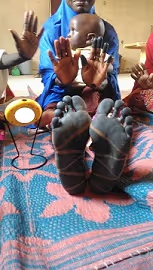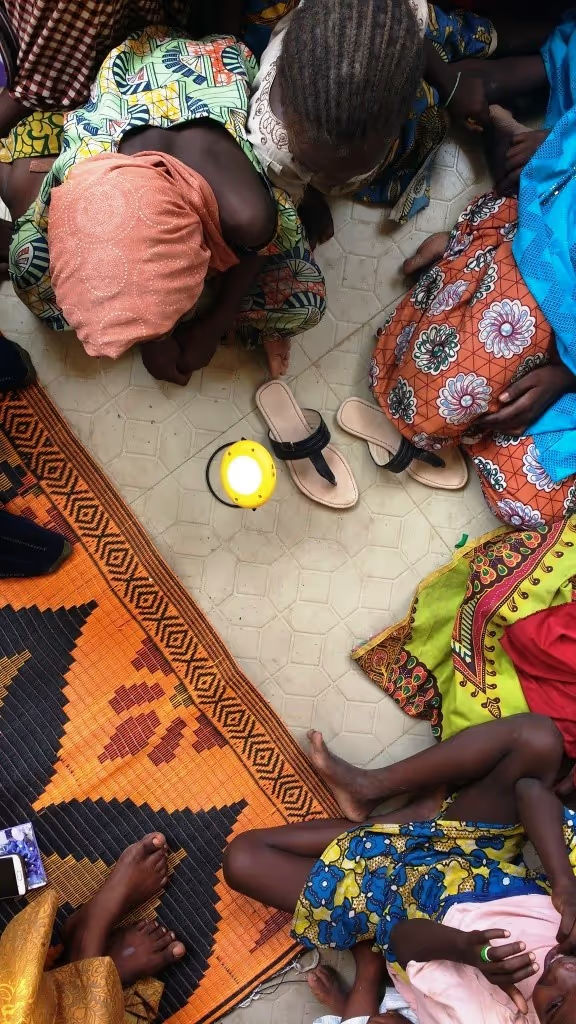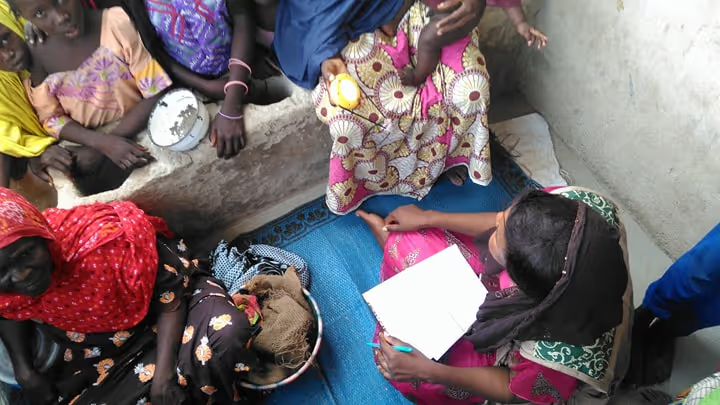Lighting up Northern Nigeria

‘The light gives me power, it takes his anonymity away’ Lighting and violence in northern Nigeria
“I never went out at night time unless I really had to. I would never let my children out at night time. There were too many men taking drugs around the latrines, I would always worry about being attacked. It was so dark, that you would never know who might attack you, you would just be left there alone in the dark afterwards. Because the men knew we couldn’t identify them, they would attack us without even thinking.

Jamila sits opposite us, talking about the camp at night time, she is holding her baby close to her, he is only 9 months old and is fascinated by the lamp Jamila has brought to show us. Oxfam and Nigerian Joint Response (NJR) distributed solar lamps to people in Jamila’s camp after discovering that nearly half of the camp felt unsafe to use the Oxfam latrines at night time.
In northern Nigeria, the war has displaced two and a half million people, fleeing conflict between the national army and non-state armed groups. The vast majority of those displaced have found refuge in the communities of Borno state; however, those without ties to the community are rendered particularly vulnerable and have to live in very poor conditions within crowded camps.
The camps are guarded by the Nigerian military and aligned militias, they control who goes in and out of the camps. Despite this, or maybe because of this, the camps have been targeted by suicide bombers, and women still fear being kidnapped by armed groups. However, for the women living in the camps, the presence of armed men, civilian or otherwise doesn’t always make them feel safer.

Whilst fleeing or being forced by the military out of territory held by non-state armed groups, many families are separated en route, as the Nigerian military detains the men and boys. The Nigerian military have detained and extra-judicially executed thousands of men and boys suspected of being Boko Haram combatants or supporters of non-state armed groups. This means that those who make it to the camps are largely women and children. Many of whom then go on to face stigma from the civilian and military personnel guarding the camps, for being affiliated with people perceived to have links to extremist groups. These women face particular risks within the camps, but feeling unsafe within the camp at night was something reported widely amongst camp residents from various backgrounds.

Following the distribution of lamps within the camp, 90% of people said they felt safer in the camps at night. The lamps facilitated more movement at night time, which helped increase family cohesion and women’s movement at night, where women previously stayed inside their tents, they were now able to socialise with their extended family staying in other tents. Women also used the lights to deter potential attackers, when they went outside at night to use the latrines.
“Now we have the lamps, I will walk outside to go to the toilet knowing that if I shine the light in the face of the man who approaches me, he will not be anonymous anymore and this gives me power, it makes him run away, it stops his bad intentions.”
All names have been changed.
By Kerry Ann Akers and Hyelni Mshelia
Stay updated
Sign up for our newsletter to receive regular updates on resources, news, and insights like this. Don’t miss out on important information that can help you stay informed and engaged.
Explore Elrha
Learn more about our mission, the organisations we support, and the resources we provide to drive research and innovation in humanitarian response.


.png)